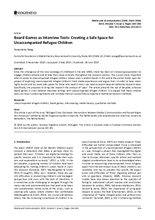Abstract
Since the emergence of the new sociology of childhood in the late 1980s, there has been an increasing expectation to engage children actively and to take their views seriously throughout the research process. This is even more important when it comes to unaccompanied refugee children, whose voice is seldom heard. In this article the author builds upon her project of exploring unaccompanied refugee children’s lived media experiences and argues that—in order to have meaningful results and to create safe spaces for those who need it most—we need to search beyond traditional research tools. Specifically, she proposes to bring into research the concept of “play”. The article presents the use of bespoke, artisanal board games in cross-national interview settings with unaccompanied refugee children. It is argued that these creative tools can help in collecting diverse and rich data that can successfully complement traditional research methods.

